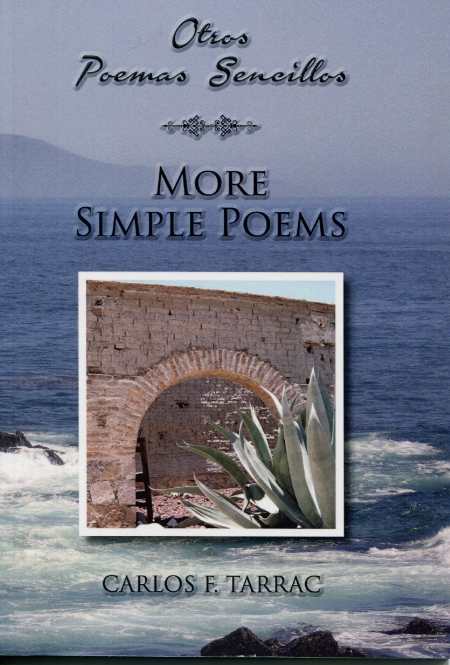Otros Poemas Sencillos/More Simple Poems
Effective metaphors are balanced by illustrations of nature in this imaginative book of poetry.
Presented in both Spanish and English, Otros Poemas Sencillos/More Simple Poems is an intriguing and varied package: in addition to the poems, which are presented on opposing pages in each language, Carlos F. Tarrac includes some of his own drawings and photographs, as well as a helpful glossary of poetic terms.
Tarrac notes in his introduction that he has tried to preserve the original essence of the poems in their translations, and in this he is mostly successful. The book starts strong with “Dry Rose,” in which the flower is a simple but devastatingly effective metaphor for aging. However, the quality of the poems quickly begins to slip, with “Loneliness” anthropomorphizing solitude—a solid idea but delivered in increasingly prosaic images:
“When I thought I had forgotten you
I prepared a special feast
to celebrate your absence …
You were not on the guest list!”
Most of the poems overuse the pronouns “I,” “you,” and “me,” which by their very nature make the pieces more literal than figurative and somewhat less interesting to read. But when such tendencies are avoided, there are bright spots in the poetry, such as the tender, contemplative portraits of birds. The illustrations, like the dual-faced girl showing questioning infancy and rebellious adolescence, are imaginative throughout.
At first, the book’s glossary, which, Tarrac writes, is included “for readers just beginning to experience the joys of poetry,” seems like a mere page filler, but he provides more than boilerplate definitions: he explains certain terms by referring to specific poems in the book that demonstrate their meaning, and he even includes the relevant verses for easier understanding. The entries for simile, metaphor, and onomatopoeia benefit from these examples, but some of the terms in the two-page glossary (provided in both English and Spanish) offer only brief, dictionary-style definitions, with no examples. The glossary—like the rest of the book—feels promising but incomplete.
There are instances of merit in the poetry, but further polishing would raise them to a level consistent enough to mark the book as a unique success, and the same applies to the other aspects of the book as well—the illustrations and the glossary. Otros Poemas Sencillos/More Simple Poems may prove to be of greater interest to those fluent in both English and Spanish, who might wish to compare the original and translated versions of the poems.
All in all, this collection is a brief diversion with sparks of life. It will be worthwhile to readers willing to overlook the more pedestrian components of the book (namely the heavy reliance on first-person accounts) and focus on the scattered bright spots instead.
Reviewed by
Peter Dabbene
Disclosure: This article is not an endorsement, but a review. The publisher of this book provided free copies of the book and paid a small fee to have their book reviewed by a professional reviewer. Foreword Reviews and Clarion Reviews make no guarantee that the publisher will receive a positive review. Foreword Magazine, Inc. is disclosing this in accordance with the Federal Trade Commission’s 16 CFR, Part 255.

